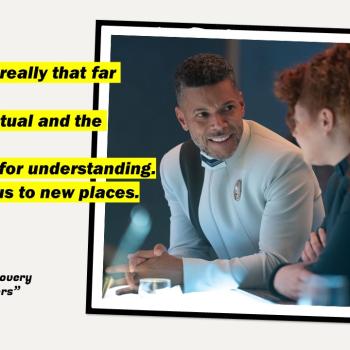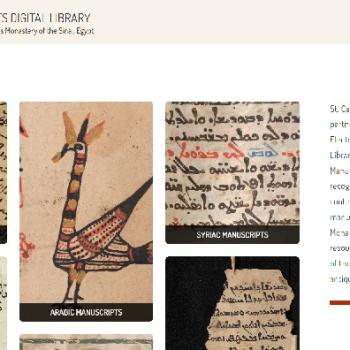I was going to call this blog entry “Taking Leave Of God”, but since I’ve actually never read Don Cupitt’s book by that title, I decided not to allude to it. The inspiration for this entry in fact comes from some verses in Exodus 33 – a story tucked away between the better-known stories of the golden calf and of the theophany in which Moses gets to see God’s “rear end” (and then provides new tablets with the “ten commandments” which don’t match those originally given in Exodus 20).
There are three possibilities with respect to the interpretation of the story in Exodus 33:1-3. One is that it was written with no intention that it be taken literally. A second is that God said things in this story that accomodated the Israelites’ understanding. Finally, one can suggest that it was indeed meant literally as written, but we cannot accept its literal meaning today. The second option seems to be merely an attempt to ‘have our cake and eat it too’, to recognize the humanness of the passage but assert its divine origin nonetheless. Of the three, the latter option seems the best fit to me.

In an ongoing discussion on another blog, I’ve been told once again that there are really only two options: theism (= belief in localized, anthropomorphized, supernatural deities, as expressed in the Exodus story) and atheism (= the denial of the existence of such beings). If this were correct, presumably that would make me and many others “Christian atheists”. But unless one wants to narrow the definition of atheism to “the denial of theism“, then I absolutely reject this dichotomy. Christian theology of the past hundred years or so has focused on thinking of God as greater than the image in this Exodus story, not less. The alternative for those who find religious language still a key part in doing justice to the wider and deeper world that science has made known to us do not simply cast aside all notions of God, but rethink the meaning of such language in light of our increased knowledge and our new perspective.
Exodus offers a God that can be left behind. Atheism recommends doing just that. Progressive Christianity, Liberal Christianity, and many other forms of sophisticated theology recommend leaving behind the image of a God that can be left behind, and adopting instead the language of God as all-encompassing transcendence. This is not “shifting the goal post” or being slippery. It is about redefining our concepts and reformulating our metaphors for the ultimate as our knowledge about the non-ultimate expands and grows. This process will only seem inappropriate to those who share the fundamentalist notion of theology as offering timeless truths and certainties untainted by culture or human limitations. To those who have studied enough theology and/or enough of the Bible and/or enough other subjects will realize that this is a natural process that occurs in all human endeavors. Music must become more daring and dissonant as familiar harmonies become boring. Language must be pushed to its limits as metaphors die. Concepts of God must be rethought and revisioned as symbols that once pointed beyond what we know now compete with science and other domains of knowledge, and lose.
Science tells us things that we can feel confident we “know” with as much certainty as is possible, using carefully defined tools and methods appropriate to its investigation and analysis. Religion (as I perceive and practice it) is more of a poetic, artistic work of the imagination, attempting to integrate as many aspects of our experience as possible in a way that allows us to think about the unthinkable and relate to the unknowables, in a way that allows us to perceive the world not merely reductionistically but in ways that take transcendence and meaning seriously.












